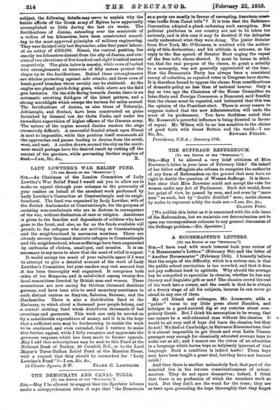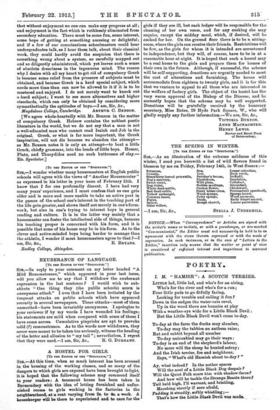A HOUSEMASTER'S LETTERS.
[TO THE EDITOR OF ass "SPECTATOR;"] Sra,—I have read with much interest both your review of "A Housemaster's Letters" (February Stb) and the letter of " Another Housemaster" (February 15th). I honestly believe that the origin of the difficulty, which is a serious one, is thab the public school curriculum is too crowded, and that it does not pay sufficient heed to aptitude. Why should the average boy be compelled to specialize in classics, whether he has any literary and linguistic gift or net-P The classics crowd the rest of his work into a corner, and the result is that he is always at a dreary stage of all his subjects, because he can never go ahead in any one of them.
My old friend and colleague, Mr. Luxmoore, adds a " patter" verse to my little poem about Eruathia, and indulges in a good-natured dig at my outcries about com- pulsory Greek. But I think his assumption to be wrong, that one cannot be a well-educated man without the classics. It would be all very well if boys did learn the classics, but they do not! We find at Cambridge, in Entrance Examinations, that it is almost impossible to get Greek and even Latin Unseen passages easy enough for classically educated average boys to make out at all; and I cannot see the virtue of an education in a language which leaves boys so helplessly ignorant of that language. Such a condition is indeed ausela ! These boys may have been taught a great deal, but they have not learned much !
And then there is another melancholy fact, that part of the mischief lies in the intense conscientiousness of school- masters. They do not spare themselves; indeed, I think that there is no profession of which the members work so bard. But they don't see the wood for the trees ; they are so bent upon grounding the boys thoroughly that they forget that without enjoyment no one can make any progress at all ; and enjoyment is the fact which is ruthlessly eliminated from secondary education. There must be some fun, some interest, some hope of getting at something amusing or delightful ; and if a few of our conscientious schoolmasters could hear undergraduates talk, as I hear them talk, about their classical work, they could hardly avoid the suspicion that there is something wrong about a system, so carefully mapped out and so diligently administered, which yet leaves such a sense of absolute dreariness in the ingenuous mind. The reason why I desire with all my heart to get rid of compulsory Greek is because some relief from the pressure of subjects must be obtained, and because Greek is a hard special subject, which needs more time than can now be allowed to it if it is to be mastered and enjoyed. I do not merely want to knock out a bard subject; I want to see more alternatives and higher standards, which can only be obtained by considering more sympathetically the aptitudes of boys.—I am, Sir, &c., .Magdalene College, Cambridge. ARTIIHR C. BENSON.
[We agree whole-heartedly with Mr. Benson in the matter of compulsory Greek. Hebrew contains the noblest poetic literature in the world, but we do not say that a man is not a well-educated man who cannot read Isaiah and Job in the original. Greek, or what is far more important, the Greek inspiration, will not die because we abandon the attempt— as Mr. Benson notes it is only an attempt—to beat a little Greek, chiefly grammar, into the heads of little boys. Homer, Plato, and Thucydides need no such buttresses of clay.— ED. Spectator.]















































 Previous page
Previous page